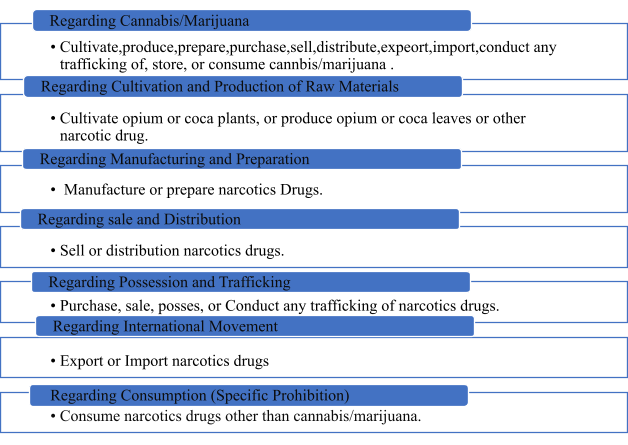Drug Trafficking Laws & Proceedings of Drug Crimes in Nepal
Drug Trafficking Laws & Proceedings of Drug Crimes in Nepal
Drug Trafficking Laws & Proceedings of Drug Crimes in Nepal Background This article provides all the detailed information about the Nepal Regulatory Framework on Narcotic
Background
This article provides all the detailed information about the Nepal Regulatory Framework on Narcotic Drugs and Psychotropic Substances, its rigorous penalties measures for production, consumption, trafficking, synthetic, restorage of drugs products with persistent challenges as it is a cross-border/extra territorial crime.
To analyze the effectiveness and limitations of current Nepali drug laws in combating drug trafficking.
Article explains about the drug trafficking case process in the court with supreme court’s latest precedents.
02. Governing Laws
The Government of Nepal has enacted robust legislation to regulate narcotic drugs and psychotropic substances, ensuring their use for legitimate purposes while preventing illicit trafficking and abuse. The key legislations are:
- Narcotic Drug Act, 2033 (1976)
- Drug Act 2035
- Muluki Criminal Code, 2074(2017)
Governing Authorities
- Department of Drug Administration
- Custom Offices in the airport, border areas
- Armed Police Force/ Police authority
- Narcotics Control Bureau (NCB)
- Government Attorney Offices
- Court
Definition of Narcotic Drugs Trafficking
According to Section 2(a) of Drug Act 2035, “drug” means any substance used for the diagnosis, cure, mitigation, treatment, or prevention of disease in humans, animals, or birds. It also includes substances used to destroy disease-causing vermin or insects, or those that affect the structure or organic function of a human, animal, or bird’s body, as well as allied ingredients or components for preparing such substances.
According to Section 3 of the Narcotic Drugs (Control) Act, 2033 (1976 A.D.), the term “Narcotic Drug” is defined comprehensively. This legal definition encompasses the following kinds of substances as drug;
- Production transporting or buying and selling, consumption, storage of drugs (Cannabis/Marijuana, opium, coca, mixing opium and extract coca, including mixture or salt.)
- Intend for Smuggling and trading of drugs
- Production, smuggling, consumption, storage of any natural or synthetic narcotic drug or psychotropic substances and their salts and other substances as may be specified by the Government of Nepal by a notification published in the Nepal Gazette
Strictly Prohibited Acts by Nepal’s Narcotic Drugs Act
According to Section 4 of the Narcotic Drugs (Control) Act, 2033 (1976 A.D.), a wide range of activities concerning narcotic drugs are strictly prohibited. These prohibitions aim to control the entire chain of drug-related offenses, from cultivation to consumption.
No person shall engage in any of the following acts:

Non-Prohibited Acts Under Drugs Law
Narcotic Drugs Control Act, Sec 5, narcotic drugs do not apply in following cases.
- Individuals can purchase and use narcotic drugs in prescribed doses from licensed shops if recommended by a recognized medical practitioner for medical treatment.
- Persons in prescribed categories may consume narcotic drugs in prescribed amounts.
- Government or institution obtaining special license for any purpose under full control and supervision of Nepal Government.
Drug Trafficking Case Process in Nepal
Pre-Trial Phase/ Investigation Process:
| 01. Search, Seizure and Arrest Police or enforcement authority gets information of offences, issues emergency warrant, and conducts search of body, belongings, property, land, or vehicles containing drugs. |
| 02. Arrest Warrant Police or NCB can issue emergency arrest warrant or arrest without warrant if necessary. |
| 03. Asset Freeze If property is earned from drug-related offences, the moveable/immovable property may be seized or frozen during investigation. |
| 04. Information to Investigation Officer Arrest and seizure details must be submitted to the concerned investigation authority within 24 hours of arrest. |
| 05. Sensor the Information Data, video, audio, documents or items used in drug crimes can be censored by investigation authority. |
| 06. Lab & Forensic Test and Dispose NCB sends seized drugs for lab testing. Drugs can be disposed after court grants remand to suspects. |
| 07. Records the Suspect Statement NCB investigates and records the statements of suspects involved in drug offences. |
| 08. Handover Investigation Report NCB submits investigation evidence and reports to the prosecutor, prepares chargesheets, and completes investigation within 90 days. |
Trial Phase
| 01. Files Chargesheet Government Attorney registers the chargesheets to District Court. |
| 02. Record Court Statement District Court records the court statements in the bench. |
| 03. Bail Hearing Bail order for further release or sending to prison for further case processing. |
| 04. Evidence Examinations Witness testimony and other physical or lab reports are verified by the court. Extraction or submission of evidences if any. |
| 05. Final Judgement Court declares or provides judgement of acquittal or conviction. |
Post-Trial Phase
| 01. Sentence Judgement / Verdict Report is submitted to the court for minimum sentence on proving guilty. Final judgement determines sentence or punishment. Punishment is allocated and the convict is sent to prison. |
| 02. Appeal Appeal can be made to the High Court or Supreme Court if not satisfied with the court judgment, or if evidence was not properly examined by the District Court. |
Punishment for the Narcotic Drug Crimes
The Narcotic Drugs (Control) Act, 2033 (1976) prescribes distinct punishments for trafficking, consumption, and cultivation of narcotic drugs to deter illicit activities while aligning with international drug control standards. The punishment provisions are as follows:
For Trafficking, sell, purchase, import and exports, stores of Drugs
| Acts | Punishment |
|---|---|
| Anyone who produces, prepares, purchases, sells and distributes, exports or imports, traffics and stores, cannabis/marijuana up to 50 grams. | Imprisonment up to 3 months or fine up to Rs. 3,000 |
| Cannabis/marijuana from 50 grams to 500 grams. | 1 month to 1 year imprisonment and fine from Rs. 1,000 to Rs. 5,000 |
| Cannabis/marijuana from 500 grams to 2 kilograms. | 6 months to 2 years imprisonment and fine from Rs. 2,000 to Rs. 10,000 |
| Cannabis/marijuana from 2 to 10 kilograms. | 1 year to 3 years imprisonment and fine from Rs. 5,000 to Rs. 25,000 |
| Cannabis/marijuana more than 10 kilograms. | 2 to 10 years imprisonment and fine from Rs. 15,000 to Rs. 100,000 |
| Anyone who sells, purchases any natural or synthetic narcotic drugs and psychotropic substance & their salt or other substances as specified by Government. | 2 to 10 years imprisonment and fine from Rs. 100,000 to Rs. 200,000 |
| Purchase, sell, distribute, export, import, traffic, store cannabis/marijuana up to 50 grams. | 3 months imprisonment or fine up to Rs. 3,000 |
| Distributes, exports, stores, or produces substances with false belief as if it was narcotic drugs. | Liable for half of the punishment of actual offender |
| Transaction of cannabis from 50 grams to 500 grams. | 1 month to 1 year imprisonment and fine from Rs. 100 to Rs. 5,000 |
| Transaction from 500 grams to 2 kilograms. | 6 months to 2 years imprisonment and fine from Rs. 2,000 to Rs. 10,000 |
| Transaction from 2 to 10 kilograms. | 1 to 3 years imprisonment and fine from Rs. 5,000 to Rs. 25,000 |
| Transaction of 10 kilograms or more. | 2 to 10 years imprisonment and fine from Rs. 15,000 to Rs. 100,000 |
| Anyone who commits any other prohibited acts (except consumption or cultivation) involving up to 25 grams of opium, coca, or derivatives. | 5 to 10 years imprisonment and fine from Rs. 5,000 to Rs. 25,000 |
| Transaction from 25 grams to 100 grams. | 10 to 15 years imprisonment and fine from Rs. 70,000 to Rs. 200,000 |
| Transaction of more than 100 grams. | 15 years to life imprisonment and fine from Rs. 500,000 to Rs. 2,500,000 |
For Consumption
| Act | Punishment |
|---|---|
| Anyone who consumes cannabis/marijuana | Imprisonment up to 1 month or fine up to Rs. 2,000 |
| Anyone who consumes opium, coca or any other narcotic drugs | Imprisonment up to 1 year or fine up to Rs. 10,000 |
| Anyone who is addicted to natural or synthetic narcotic drugs, psychotropic substances, or their salts as specified by Government | Imprisonment up to 2 months, fine up to Rs. 2,000, or both |
For Cultivation
| Acts | Punishment |
|---|---|
| Anyone who cultivates opium poppy or coca bush up to 25 plants | 1 to 3 years imprisonment or fine from Rs. 5,000 to Rs. 25,000 |
| Anyone who cultivates more than 25 plants of opium or coca | 3 to 10 years imprisonment and fine from Rs. 25,000 to Rs. 200,000 |
| Anyone who cultivates up to 25 cannabis/marijuana plants | 3 months imprisonment or fine of Rs. 3,000 |
| Anyone who cultivates more than 25 cannabis/marijuana plants | 3 years imprisonment or fine from Rs. 5,000 to Rs. 25,000 |
House, Land and Vehicle Used for Narcotic Drugs Trafficking
| Act | Punishment |
|---|---|
| Owner permits house, land, or vehicle to anyone for committing a drug-related crime | 6 months to 5 years imprisonment or fine up to Rs. 10,000 Confiscation of such building, land, or vehicle |
Punishment for Repeated Offence Suspects
| Act | Punishment |
|---|---|
| Once punished under this law, if the person commits the offence again (repeated offence) | Punishment for the subsequent offence plus an additional imprisonment of up to 5 years and fine up to Rs. 100,000 |
Punishment for Conspiracy, attempt, abetment and accomplice
| Act | Punishment |
|---|---|
| Person involved in conspiring or attempting to commit a drug offence | Half the punishment of the actual offender |
Confiscation of vehicle, goods, earned property by illegal transaction of Drugs
| Act | Punishment |
|---|---|
| Immovable and movable property owned or earned from narcotic drug trafficking | Confiscation of property, vehicles, or goods used in committing the crime |
No Punishment and Proceedings for the Narcotic Drug Crime
| Act | No Punishment and Proceedings |
|---|---|
| Petty small quantity drugs for consumption of small dose and for the first-time offence | Sign a bond and release; withdrawal of proceedings |
| Drug consumer undergoing treatment or rehabilitation in a recognized institution | No proceeding during ongoing treatment |
| Storage of drugs by license holder | License holder not liable for punishment |
Reward for Secret Informer
Informer of the same crime shall be liable for 25 percent of amount of fine as reward and will kept secret
Trends and Challenges for Drug Trafficking Cases in Nepal
- Bail is rarely permitted for huge transaction commercial seizure
- No Bail for foreigners in drug cases as it is considered as a high gravity offence in Nepal.
- Deportation of foreign Nationals once convicted and after serving jail term.
- Mostly drug smuggling is being done via. International Parcels and foreigners carrying drugs are arrested in Airport
Supreme court judgment on drugs trafficking in Nepal
Gov of Nepal vs. Dorik Prasad Yadav etl NKP 2080, D.NO. 11154
Being present at the location where incriminating items are seized is different from being involved in the crime itself. In the absence of any other evidence linking the accused to the offence, merely finding the accused at the place where the illegal items were discovered cannot be considered sufficient proof to hold them guilty.
Gov of Nepal vs. Raju Maharjan, NKP 2080 D.NO. 11143
There is no conclusive rule that a phone SIM registered in one person’s name cannot be used by another. Simply showing that the phone number mentioned by the co-accused is registered in the name of the accused is not sufficient alone to prove the accused’s guilt.
Contributing Team Members
Frequently Asked Questions
For quick legal assistance:
You can directly call to our legal expert: +9779841933745
Even can call or drop a text through What's app , Viber, Telegram and We Chat at the same number.
Also can do email on : info@lawinpartners.com
Get in Touch with Our Legal Experts
Have a question or need legal assistance? Fill out our contact form and our team of experienced lawyers in Kathmandu, Nepal will get back to you promptly.
Please include your WhatsApp or Viber number in the phone section if you'd prefer a direct call from one of our legal professionals.
We are here to provide trusted legal support tailored to your needs.
Phone : +9779841933745, +9779841933745



